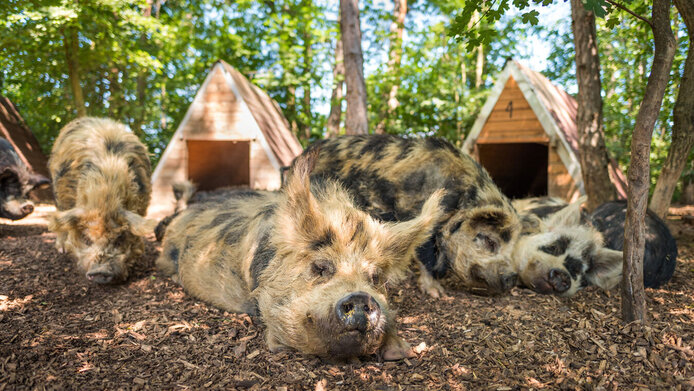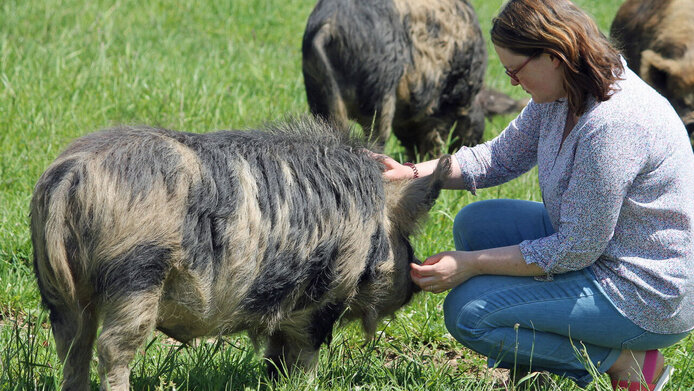The crown is slipping

Every time Bello gives a paw, he gets a treat. There is no limit to his willingness to play along. Luna, another dog, is watching. She also gives a paw, but does not get a reward. Realising quickly how unfair this game is, Luna feels discriminated against and stops playing along. This is the type of experiment conducted at the Messerli Research Institute in Vienna at the Clever Dog Lab. Apart from dogs, the biologists there also observe the behaviour of cockatoos, mountain parrots and free-range pigs.
We have known for a very long time that animals are intelligent. This is true not only of our closest relatives, the great apes, but also of dolphins, whales or birds. Even the invertebrate squid can solve complex problems. Just recently, researchers have found a possible explanation for the evolution of intelligence in cephalopods. Scientists have produced some astonishing findings since the 1990s, when research into the social intelligence of non-primate animals started to gain increasing momentum. Animals are not only intelligent, they feel and cooperate, they grieve, argue and have a sense of justice, as demonstrated by the example of Bello and Luna.
The ethical perspective
What does this mean for the relationship between humans and animals and especially for the self-image of human beings as the crown of evolution? This is the point where philosophers such as Judith Benz-Schwarzburg come in. This scholar specialises in animal ethics and explores the following question: what if animals possess something like moral capacity and why is that relevant from an ethical perspective? In this respect, her research complements the work of the cognitive and behavioural researchers at the Messerli Research Institute for Human-Animal Relations at the University of Veterinary Medicine Vienna. In an ongoing research project funded by the Austrian Science Fund FWF, Benz-Schwarzburg and her team are first trying to determine the character and socio-cognitive preconditions of moral behaviour in animals in more detail, and subsequently to explore the ethical consequences.
Empathy as a moral emotion
Philosophical debates on moral capacity in animals are focusing increasingly on the role of emotions. “There has been a dispute in philosophy for centuries as to whether we should give more weight to rationality or emotionality,” says Benz-Schwarzburg. Rationalist philosophers from Aristotle to Kant considered humans as the only moral subjects because they can reflect on the reasons for their actions and are capable of taking responsibility. This, they said, distinguishes them from animals.
“We assume, however, that moral behaviour is not so much linked to intellectual reflection, but is strongly based on emotions. One such moral emotion is empathy,” notes Benz-Schwarzburg. This means that an animal acting on the basis of empathy is sufficiently morally motivated to consider this as moral action. “We need this description also to be able to explain large parts of moral interaction between people, not only in young children and adolescents, where moral ability develops in gradations, but also in adults.” It often happens that we do not reflect on why we behave the way we do, but still act in a moral way: whenever we are spontaneously helpful, when we are happy for someone else or, in an extreme case, save a child from drowning – and do so without thinking long and hard about whether and why this is good and the right thing to do.
Natural social instincts
Back to the Messerli Institute and this time to the Clever Pig Lab in Lower Austria, where domestic pigs from New Zealand currently live freely on an area of several hectares – soon they will be moving to a new home. In this setting, the markedly social behaviour of these animals can be easily observed. Pigs live in groups, like to touch each other, are extremely inquisitive and communicate constantly. Birte Wrage, a doctoral student in the project team, accords special importance to touch and the sense of caring – so far these two aspects had not been taken into account by any research.

When pigs are kept as farm animals, they are often prevented from living according to their natural social instincts. Mother pigs are separated from their piglets, for instance. The animals not only feel their own stress created by this situation, they also feel the stress of their peers, and when they are isolated, they have no possibility of comforting each other. In order to understand the significance of such (disrupted) interactions, Benz-Schwarzburg and her team rely on existing ethical theories such as the capabilities approach developed by the American philosopher Martha Nussbaum. Nussbaum places capabilities such as empathy at the centre of what constitutes a life that is just, good and flourishing. These concepts can also be transferred to animals.
Caring as the basis of moral capacity
Like humans, animals practise how to behave correctly in certain situations in the course of their socialisation. But the motivation to do so is also inherent in the individual itself, as researchers know from experiments where the capacity for empathy was deliberately “switched off” in the brain of animals. If people or animals cannot live their normal social behaviour to the full, they lose their moral abilities and become aggressive and antisocial. For this reason, the ethics of care, a feminist-inspired theory that Benz-Schwarzburg and Wrage also make reference to, focuses on the aspects of caring for one another and, especially, the mother-child relationship to define the foundations of moral capacity. This in turn creates a problem for the relationship between humans and animals.
Underestimating the social skills of animals
In many ways, humans constantly prevent animals from exercising their moral behaviours based on caring. “Farm animals are often placed in different groups, which means they not only lose family relationships but also friendships. For animals this plays an important role,” says Benz-Schwarzburg, and she adds: “Today we know with increasing empirical insight, that rats, for example also feel compassion and that pigs are comparable to dogs when it comes to certain cognitive and emotional capabilities. This shows that we have underestimated the complex social abilities of animals for far too long.” These insights raise uncomfortable questions for humans and their claims to moral superiority about how animals should be treated. “There are many contexts that we ignore and romanticise,” notes Benz-Schwarzburg and mentions pet and zoo animal husbandry as examples. What can ethics achieve in this regard? “We can shed light on where those forms of interaction that are taken for granted become dubious and we can explain why this is so.”
One feels that future research will discover a great deal of new knowledge that could fundamentally change the relationship between humans and animals. A broad interdisciplinary discourse can help to find out what rights that are granted to humans would also be relevant for animals.
Personal details
The project leader Judith Benz-Schwarzburg conducts research in the Unit of Ethics and Human-Animal Studies at the Messerli Research Institute at the University of Veterinary Medicine Vienna, the University of Vienna and the Medical University of Vienna. She holds a PhD in philosophy from the University of Tübingen and works on socio-cognitive abilities in animals and their relevance for animal ethics and animal welfare. The project “Moral capacity in animals” (2018–2023) is funded by the Austrian Science Fund FWF with 400,000 euros.
Publications
Wrage B.: Caring animals and care ethics, in: Biology & Philosophy, in press
Monsó S.: How to Tell If Animals Can Understand Death, in: Erkenntnis 87, 2022
Monsó S. & Wrage B.: Tactful animals: How the study of touch can inform the animal morality debate, in: Philosophical Psychology, 34 (1), 2020
Monsó S., Benz-Schwarzburg J., Bremhorst, A.: Morality in animals: what it means and why it matters, in: Journal of Ethics 22(3), 2018





